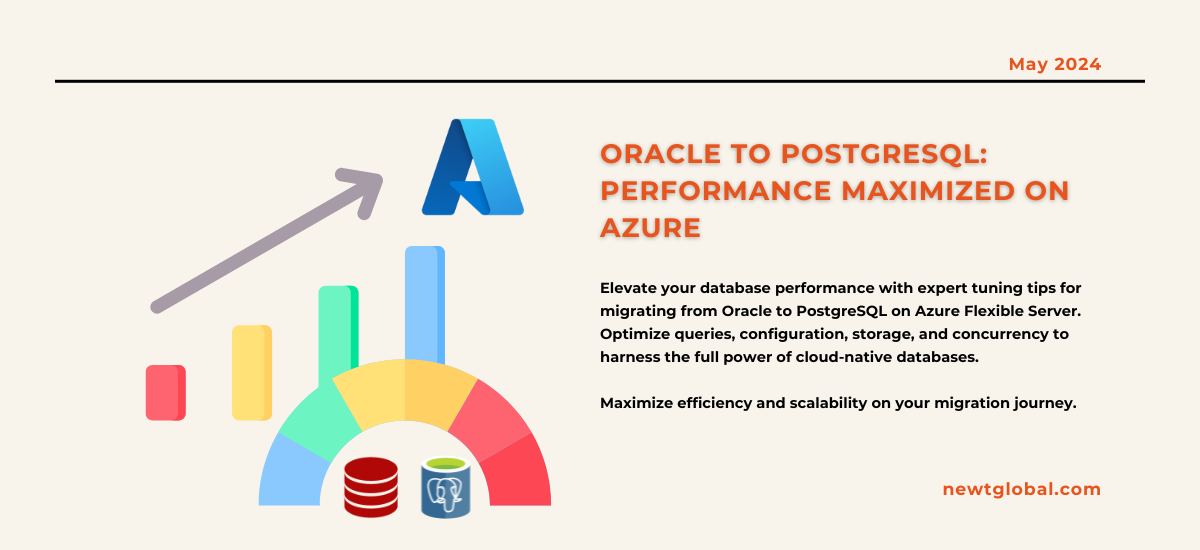
Are you thinking about moving your Oracle database to PostgreSQL on Azure Flexible Server to make it work better? Whether you’re someone who’s used Oracle for a long time and wants a cheaper option or you’re really into PostgreSQL and want to explore more advanced ways of moving to the cloud, this blog is made for you.
Oracle databases are known for being really reliable and scalable, but lately, more and more people are interested in switching to PostgreSQL, especially with options like Azure Flexible Server. It’s important to understand the details of this switch to make sure it goes smoothly and works well.
Many organizations are now moving from Oracle to PostgreSQL, especially when they’re moving to cloud platforms like Azure Flexible Server. PostgreSQL is attractive because it’s open source, which means it’s often cheaper and has a big community behind it. But switching isn’t just about moving data – you need to make sure everything runs smoothly and performs well. In this blog, we’ll go over some important tips to help you optimize your PostgreSQL database on Azure Flexible Server after moving from Oracle.
Tuning Tips for Performance Optimization
-
- Understand the Differences: Before you start making changes, it’s important to know how PostgreSQL and Oracle are different. They both manage databases, but they have different ways of doing things. Oracle is a big name in business databases, known for being strong and having lots of features. PostgreSQL is open-source and known for being flexible and having lots of support from its community. Knowing these differences will help you plan your switch better.
-
- Move Your Data and Structure: Moving your data and how it’s organized is a big part of switching databases. There are tools that can help with this, but you’ll also need to double-check everything manually. Pay attention to how data types match up between Oracle and PostgreSQL, and make sure things like rules and stored procedures work correctly in PostgreSQL. You might also want to use some of PostgreSQL’s special features to organize your data better and make things faster.
-
- Make Your Queries Work Better: Writing good SQL queries is key to making your database run smoothly. Even though Oracle and PostgreSQL use similar SQL, they work differently under the hood. Look at your current queries and see where you can make them faster. You might need to simplify things or use PostgreSQL’s special features to make them work better. PostgreSQL can also help you see how your queries are running so you can find problems and fix them.
-
- Set Up Your Database Right: PostgreSQL lets you tweak lots of settings to make it work better for your needs. You’ll want to adjust things like how much memory your database uses and how it handles multiple users. Experimenting with these settings and keeping an eye on how your database performs will help you get the best results.
-
- Choose the Right Storage: Picking the right kind of storage for your database is important for making it fast. You might need really fast storage for some things, while other data can be stored more cheaply. Using different kinds of storage and keeping an eye on how your database uses them can help you get the best performance for your money.
-
- Use Parallelism and Concurrency: PostgreSQL can run lots of things at once, which can make it faster. You can adjust how many things it does at once to make sure it’s using your resources well. You’ll also want to make sure that multiple people can use your database at the same time without getting in each other’s way. PostgreSQL has tools to help with this, so you can make sure everything stays fast and accurate.
-
- Keep an Eye on Performance: Once you’ve got everything set up, it’s important to keep an eye on how your database is doing. There are tools that can help you see how it’s running and find problems before they get too big. Making small tweaks over time will help you keep your database running smoothly and taking advantage of everything Azure Flexible Server has to offer.
Conclusion
In conclusion, switching from Oracle to PostgreSQL on Azure Flexible Server can save you money and give you more options, but it takes careful planning and tweaking to get the best performance. By following these tips, you can make sure your PostgreSQL database runs as smoothly as possible in the cloud.
If you’re ready to take the leap and migrate your Oracle database to a cloud-native PostgreSQL environment quickly, efficiently, and affordably, Newt Global’s DMAP is the solution you’ve been searching for. Newt Global DMAP is a world-class product enabling mass migration of Oracle Db to cloud-native PostgreSQL faster, better and cheaper.
Don’t miss out on the opportunity to transform your database systems with ease. For more information, visit newtglobal.com. If you have any questions or need to get in touch, please don’t hesitate to reach out at marketing@newtglobalcorp.com. We’re here to help you make your migration journey smooth and successful.
